Module 3 Body Language and Non-Verbal Communication introduction and cultural corner
文档属性
| 名称 | Module 3 Body Language and Non-Verbal Communication introduction and cultural corner | 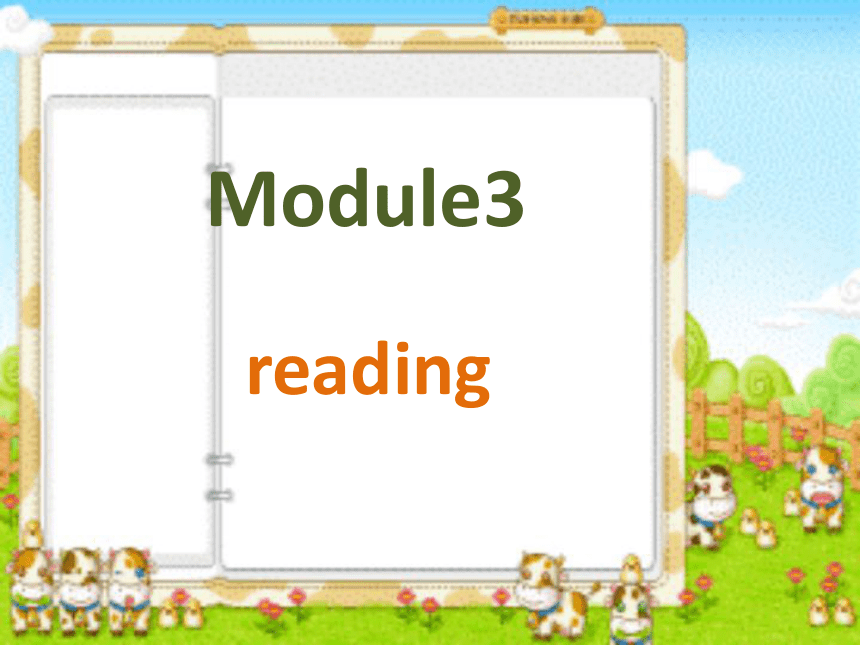 | |
| 格式 | zip | ||
| 文件大小 | 3.8MB | ||
| 资源类型 | 教案 | ||
| 版本资源 | 外研版 | ||
| 科目 | 英语 | ||
| 更新时间 | 2013-05-15 21:44:04 | ||
图片预览



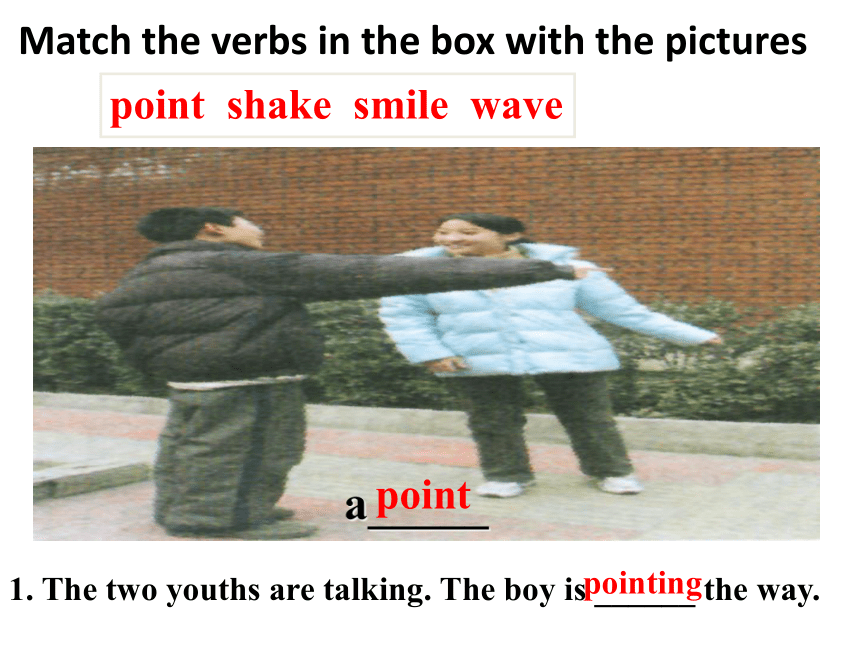
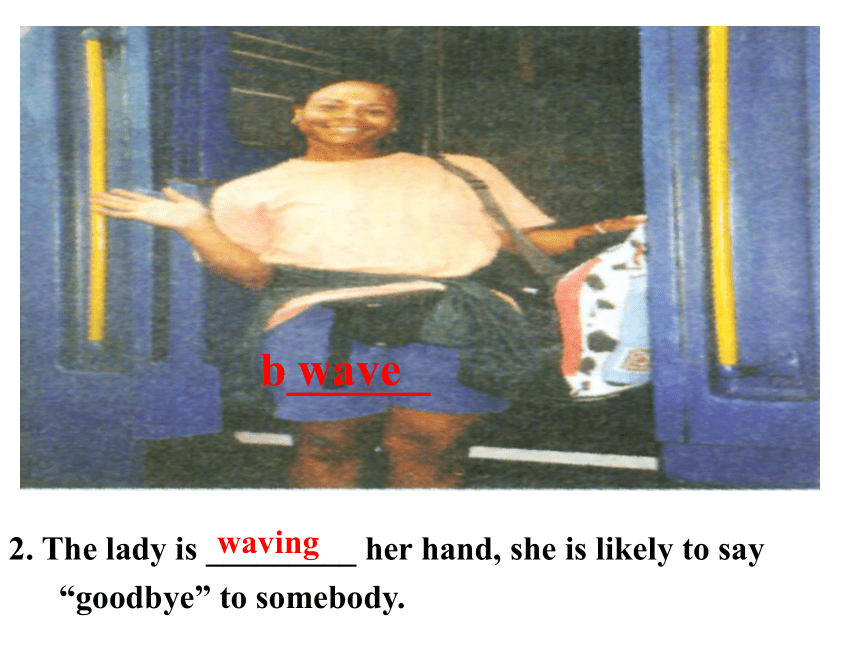
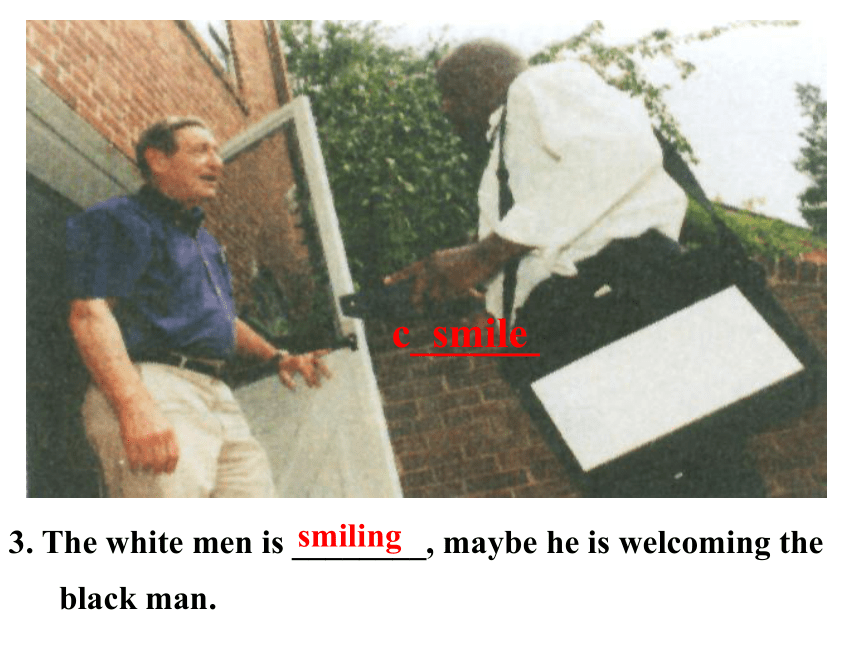
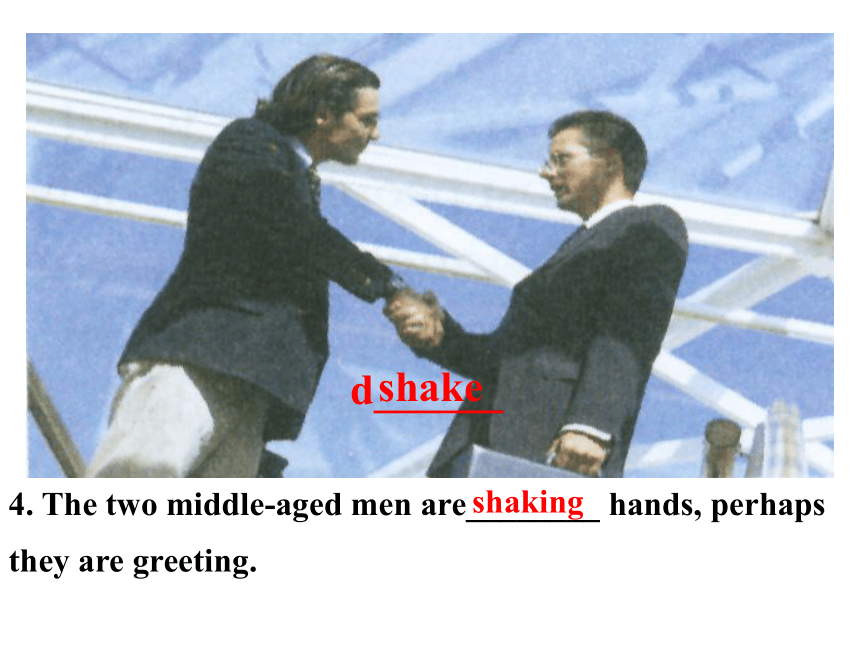
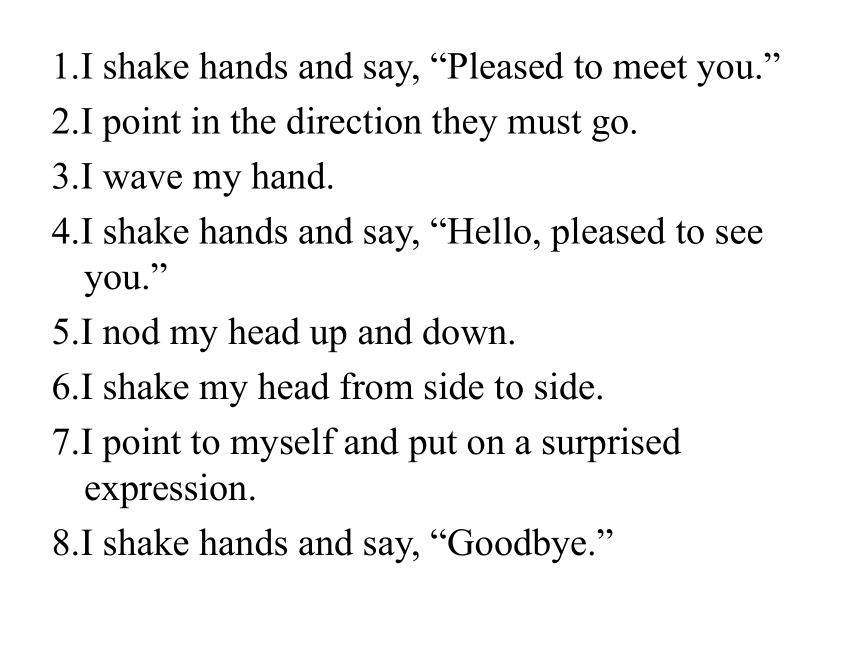
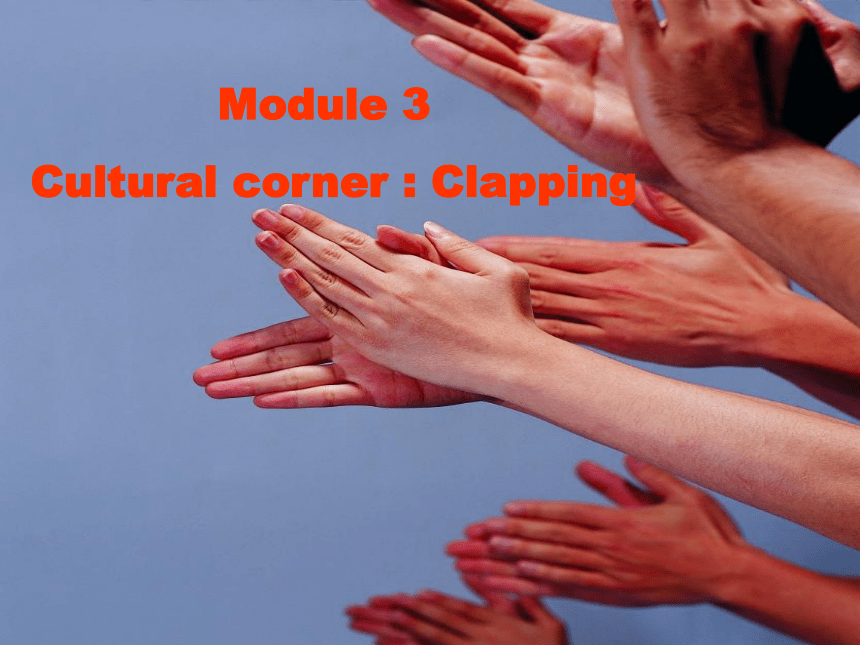
文档简介
课件27张PPT。Module3readingPLAYDo you know this man? What do you know
about him?
He’s called Mr. Bean, Who is a comedian expressing himself by body language. Match the verbs in the box with the pictures a_____point shake smile wave point 1. The two youths are talking. The boy is ______ the way. pointingb______wave 2. The lady is _________ her hand, she is likely to say “goodbye” to somebody.wavingc______smile 3. The white men is ________, maybe he is welcoming the black man.smilingd______shake4. The two middle-aged men are________ hands, perhaps
they are greeting.shaking1.I shake hands and say, “Pleased to meet you.”
2.I point in the direction they must go.
3.I wave my hand.
4.I shake hands and say, “Hello, pleased to see you.”
5.I nod my head up and down.
6.I shake my head from side to side.
7.I point to myself and put on a surprised expression.
8.I shake hands and say, “Goodbye.” Module 3
Cultural corner : ClappingWhen do you clap? Why?Find the topic sentence of each paragraph.Para 1: the custom of clapping has early beginnings
Para2: why and when do we clap
Para 3: the features of applauseRead the text to answer the following questions:On what occasions do people clap?
What did applause mean in classical Athens?
What did the prolonged clapping help?
4) What are the features of clapping?
5)Do people from different cultures clap on the same occasions?
1) On what occasions do people clap?We clap at the end of a live performance, such as a play, or a concert, to say thank you to the performers.
In Britain, people clap at a wedding, but in Italy, they sometimes clap at a funeral.at a weddingat a funeral at a funeral 2)What did applause mean in classical Athens?
3)What did the prolonged clapping help?Applause meant judgment and taking part. Prolonged clapping helped a play to win.
4)What is the features of clapping?Clapping is social, like laughter, it is
infectious, and spread very quickly.
No, some occasions on which people clap change from one country to another. 5)Do people from different cultures clap on the same occasions? Read the text once again and fill in the blank:To show we like somethinga live performancethe performersjudgementto win——————————————————————equalityaloneinfectiousspreadsweddingfuneralOccasions
1.现场表演
2.从早就有
3.与..竞争
4.持久的鼓掌
5.容纳50人
6.发出很大的声音/噪音
7.一种平等的标志
8.把..添加到…
9.独自一人大笑
10.普通/普遍的习惯
11.在一些场合
12.在婚礼上/葬礼上1.a live performance2.have early beginnings3.compete with / in competition with4.prolonged clapping hold/contain/seat/accommodate 50 people6.make a lot of noise7.a sign of equality8.add…to…9.laugh (out) loud alone10.a universal habit11.on some occasions12.at a wedding/funeral
Language Points:
We don’t clap at the end of a television program or a book, however good they are.
however用作连接副词,相当于no matter how ,引导让步状语从句,意思是“不管怎样”
“无论如何......”,具体结构如下:
(1)however+adj.+主语+系动词
However rich people are, they always seem anxious to take more money.
无论人们多么富裕,他们似乎总是渴望挣到更多的钱。
(2)however+adv.+主语+谓语
However fast he runs, he can’t catch up with us.
无论他跑得多快也不能赶上我们。
occasion 时刻, 时候, 场合 on this/that occasion此时/彼时
on one occasion有一次
I've met her on several occasions recently.
我最近见到过她好几次。
时机, 机会
This is not an occasion for laughter. 这不是笑的时候。 occasion 做先行词用when/on which 引导。
There are some occasions when people can’t express themselves freely.人们在许多场合下不能自由的表达自己。
about him?
He’s called Mr. Bean, Who is a comedian expressing himself by body language. Match the verbs in the box with the pictures a_____point shake smile wave point 1. The two youths are talking. The boy is ______ the way. pointingb______wave 2. The lady is _________ her hand, she is likely to say “goodbye” to somebody.wavingc______smile 3. The white men is ________, maybe he is welcoming the black man.smilingd______shake4. The two middle-aged men are________ hands, perhaps
they are greeting.shaking1.I shake hands and say, “Pleased to meet you.”
2.I point in the direction they must go.
3.I wave my hand.
4.I shake hands and say, “Hello, pleased to see you.”
5.I nod my head up and down.
6.I shake my head from side to side.
7.I point to myself and put on a surprised expression.
8.I shake hands and say, “Goodbye.” Module 3
Cultural corner : ClappingWhen do you clap? Why?Find the topic sentence of each paragraph.Para 1: the custom of clapping has early beginnings
Para2: why and when do we clap
Para 3: the features of applauseRead the text to answer the following questions:On what occasions do people clap?
What did applause mean in classical Athens?
What did the prolonged clapping help?
4) What are the features of clapping?
5)Do people from different cultures clap on the same occasions?
1) On what occasions do people clap?We clap at the end of a live performance, such as a play, or a concert, to say thank you to the performers.
In Britain, people clap at a wedding, but in Italy, they sometimes clap at a funeral.at a weddingat a funeral at a funeral 2)What did applause mean in classical Athens?
3)What did the prolonged clapping help?Applause meant judgment and taking part. Prolonged clapping helped a play to win.
4)What is the features of clapping?Clapping is social, like laughter, it is
infectious, and spread very quickly.
No, some occasions on which people clap change from one country to another. 5)Do people from different cultures clap on the same occasions? Read the text once again and fill in the blank:To show we like somethinga live performancethe performersjudgementto win——————————————————————equalityaloneinfectiousspreadsweddingfuneralOccasions
1.现场表演
2.从早就有
3.与..竞争
4.持久的鼓掌
5.容纳50人
6.发出很大的声音/噪音
7.一种平等的标志
8.把..添加到…
9.独自一人大笑
10.普通/普遍的习惯
11.在一些场合
12.在婚礼上/葬礼上1.a live performance2.have early beginnings3.compete with / in competition with4.prolonged clapping hold/contain/seat/accommodate 50 people6.make a lot of noise7.a sign of equality8.add…to…9.laugh (out) loud alone10.a universal habit11.on some occasions12.at a wedding/funeral
Language Points:
We don’t clap at the end of a television program or a book, however good they are.
however用作连接副词,相当于no matter how ,引导让步状语从句,意思是“不管怎样”
“无论如何......”,具体结构如下:
(1)however+adj.+主语+系动词
However rich people are, they always seem anxious to take more money.
无论人们多么富裕,他们似乎总是渴望挣到更多的钱。
(2)however+adv.+主语+谓语
However fast he runs, he can’t catch up with us.
无论他跑得多快也不能赶上我们。
occasion 时刻, 时候, 场合 on this/that occasion此时/彼时
on one occasion有一次
I've met her on several occasions recently.
我最近见到过她好几次。
时机, 机会
This is not an occasion for laughter. 这不是笑的时候。 occasion 做先行词用when/on which 引导。
There are some occasions when people can’t express themselves freely.人们在许多场合下不能自由的表达自己。
